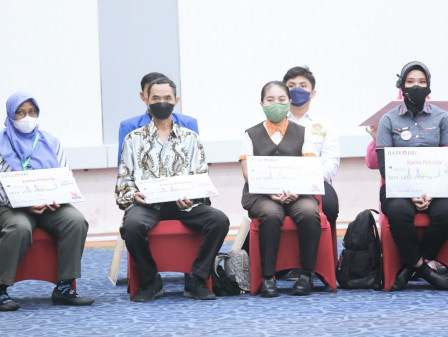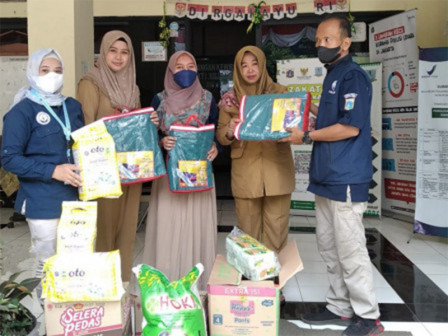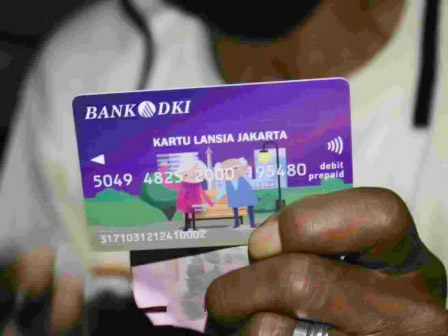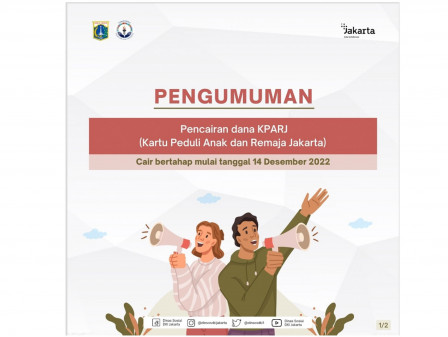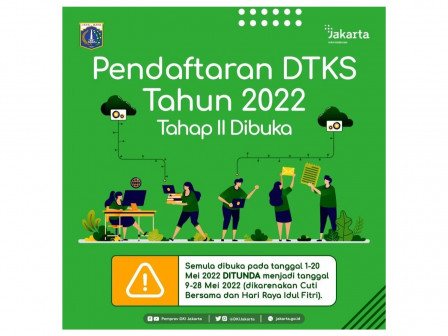Dinsos Keeps Verifying DTKS Validation to Ensure Eligibility of Social Assistance Recipients
Reported by Aldi Geri Lumban Tobing | Translated by Nugroho Adibrata
The Corruption Eradication Commission (KPK) through Circular Letter Number 11/2020 emphasized that the Integrated Social Welfare Data (DTKS) managed by the Social Ministry is the database used to provide social assistance to the community nationally. It was stated that the DTKS was undergoing improvements, thus aid recipients could be right on target. The role of local government in this case is the Social Agency (Dinsos), which is by carrying out verification and validation.
it is important to evaluate the eligibility of residents who have registered
"Referring to Social Minister Regulation Number 3/2021, local governments can verify and validate DTKS. We know that data is dynamic, so it is important to evaluate the eligibility of residents who have registered with the DTKS (inclusion error)," expressed Jakarta Dinsos Head, Premi Lasari, in the Jakarta Provincial Government's press release, Wednesday (11/10).
He explained the Jakarta Government keeps comparing data on all social assistance with several other comparative data.
Ensure Assistance is Right on Target, Disdik Conducts Due Diligence and Re-Verification"We also compare this DTKS with data from the Targeting for the Acceleration of Elimination of Extreme Poverty (P3KE) from the Coordinating Ministry for Human Development and Culture, as well as Jakarta Carik data collected by the Jakarta Agency of Empowerment, Child Protection and Population Control. We also do this by matching population data, asset ownership data, sub-district meetings, as well as field verification by data collectors and social assistants based in urban villages," he explained.
The Dinsos updated the DTKS for 5,327,074 residents registered with DTKS, which is the improvement to the DTKS determined for February 2022 through urban village deliberations in June 2022. From DTKS in February 2022, 4,497,724 were recorded, of which 1,143,639 were not eligible. Further, from the results of the DTKS improvements, data on social assistance recipients was simultaneously revised for social assistance sourced from the State Budget (APBN), such as PKH, BPNT, and PBI JKN recipients.
"One example of the form of data cleansing conducted is the ineligibility of 25,996 PKH and BPNT social assistance recipients, as well as 12,045 PBI JKN recipients resulting from the equivalent of DTKS ineligibility in February 2022," he furthered.
The basis for determining the poor is regulated in the Social Minister's Decree Number 262/2022:
1. Not having shelter/daily living
2. Head of family who does not work
3. Feeling worried about not eating or not having eaten in a year
4. Food expenses are higher than half of total expenses
5. No expenditure on clothing during the past year
6. Most of the residences only bamboo walls, wire, wooden planks, tarpaulin, cardboard, walls without plaster, thatch or zinc
7. Do not have a toilet or use a public toilet
8. Lighting source is 450 watts or non-electric
Meanwhile, typical regional variables as regulated in Governor's Decree Number 1250/2020 on limit social assistance recipients with the following provisions:
1. No household members who are permanent employees of BUMN, PNS, TNI/Polri, and/or members of DPR/DPRD
2. Do not have a car
3. Do not own land and/or buildings with a Tax Object Sales Value (NJOP) above Rp 1,000,000,000
4. Do not consume at least 19 liters of branded bottled water
5. Not poor based on local community assessment
Evaluations have also been conducted on social assistance recipients sourced from the APBD in July 2023. Of 206,695 Jakarta Elderly Card (KLJ) recipients, 6,107 were excluded from the data with details: 2,516 died, 37 moved outside Jakarta, 2,453 have cars, 1,059 have NJOP above Rp 1 billion, 42 have cars and have NJOP above 1 billion.
As for the Jakarta Disability Card (KPDJ) recipients, out of 21,172 people, 282 people were issued with details: 214 died, 2 moved outside Jakarta, 41 have cars, and 25 have NJOP above Rp 1 billion.
Of 15,355 recipients of the Jakarta Children's Card (KAJ), 3 people were expelled with the following details: 2 died and 1 moved outside Jakarta. Meanwhile, the Jakarta Children and Youth Care Card (KPARJ) was 2,527, which was issued because three people owned a car.
On the other hand, the Social Agency (dinsos) also submitted DTKS to the Education Agency (Disdik) to verify prospective recipients of the Jakarta Smart Card (KJP) Plus and the Jakarta Excellent Student Card (KJMU). He emphasized, field verification would continue to be carried out until the end of this month for all social assistance recipients. Then, the results of this field verification would be input into the Next Generations Welfare Information System (SIKS-NG) application belonging to the Social Ministry. Thus, the DTKS data resulting from verification and validation carried out by the Jakarta Provincial Government would be verified by the Social Ministry.
For Jakarta residents who want to check whether the DTKS status has been accepted or not, they can view it via the website siladu.jakarta.go.id. Through this website and application, they can also send suggestions or complaints regarding DTKS. Complaints from residents will also be followed up immediately.
Dinsos will keep pushing the verification process every year on an ongoing basis to ensure the accuracy of the data that will be used as a reference for providing social assistance in Jakarta.
"After all, this social assistance uses people's money, so we have to ensure that it is right on target and can be accounted for," he asserted.

